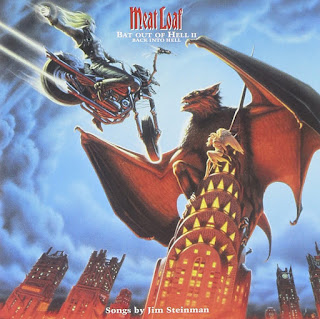Some sixteen years ago, an unknown vocalist by the name of Meatloaf, fresh from a stint with Ted Nugent’s mid-‘70s Free-For-All band, hooked up with a songwriter named Jim Steinman and recorded what was destined to become a rock classic: 1978’s Bat Out of Hell. Critics hated it with a passion, but to an American audience sick of watered-down rock ‘n’ roll, disgusted with disco, and unfamiliar with punk stirrings a continent away, Bat Out of Hell – with its bombastic, guitar-driven tales of young lust, alienation, and romance – was bigger than life. The album has been a consistent best seller since its 1977 release.
After a much publicized and highly public split, Steinman went on to write a handful of hits for artists like Bonnie Tyler, while Meatloaf recorded a bunch of albums (some good, some not-so-good) in a battle against obscurity. To the benefit of an audience still starved for the real rock thing, the duo has reunited to create a sequel to one of the most enduring albums in rock history.
Slapping Bat Out of Hell II: Back Into Hell onto the CD player is like being nineteen again. This is the elusive pulse of rock ‘n’ roll, that hard-to-capture spirit of the music and all of its promise that makes Bat Out of Hell II and its predecessor work so well. It’s like trying to tell a stranger about rock ‘n’ roll – if they don’t get it, chances are, they never will. This disc is loud, overblown and exaggerated, but it’s also got more hooks than a Bassmasters’ tournament and it rocks like a house afire. Even as history repeated itself and critics slagged Bat Out of Hell II, it shot straight up to number one upon its release.
The world is a different place than 1977, though, and this sequel reflects the urgency and identity of the decade. The cynicism of “Life Is A Lemon and I Want My Money Back,” the erotic fantasies of “Out of the Frying Pan (And Into the Fire),” the confusion of “It Just Won’t Quit” all play to a different time and place. It’s the two key cuts here, however – the idealistic, decade-old “Rock and Roll Dreams Come Through” and “Wasted Youth/Everything Louder Than Everything Else” – that serve as the youthful anthems around which all else revolves. It’s the energy, the hope provided by these songs, that attracts the audience. It’s what Meatloaf does best. It may be better to burn out than to fade away, and I’m glad that Meatloaf captured the chance to burn brightly again. (Epic Records/Cleveland International, 1993)
Review originally published by R.A.D! Review and Discussion of Rock ‘n’ Roll zine, December 1993


No comments:
Post a Comment